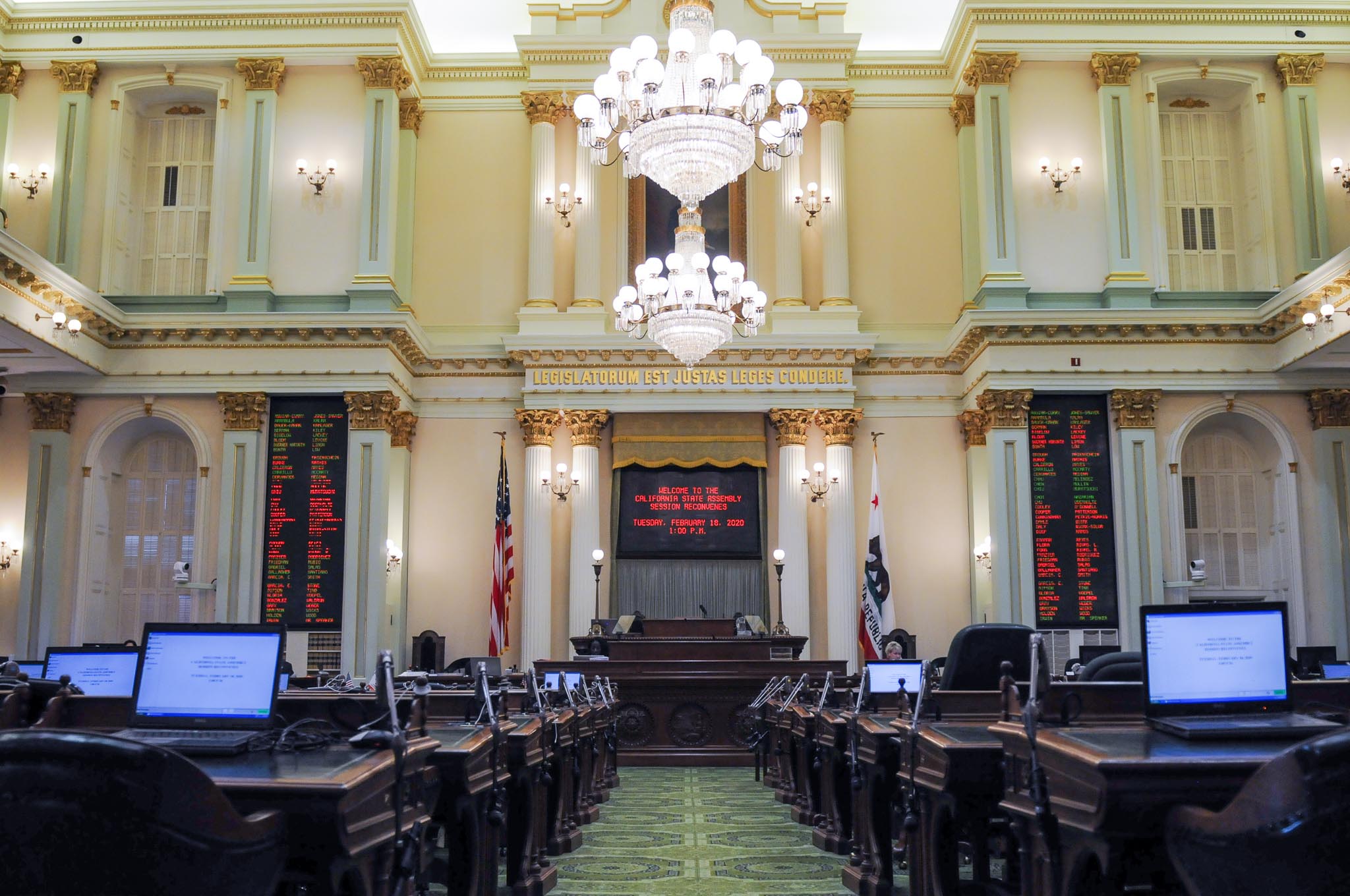
Governor Gavin Newsom signs the 2020-2021 state budget. (Photo: CA.gov)
AB 150, the Tax Budget Trailer Bill: What Does it Do Exactly?
California’s massive $263 billion budget
By Chris Micheli, July 16, 2021 2:59 pm
The Legislature passed and Governor Newsom signed on July 16 Assembly Bill 150, the tax budget trailer bill, by the Committee on Budget dealing with Sales and Use Tax Law, Personal Income Tax Law, and Corporation Tax Law.
AB 150 [Chapter 82], amends Sections 38.10, 6363.9, 6363.10, 6902.7, 17053.88.5, 17053.91, 17055, 17059.2, 23688.5, 23689, and 23691 of, adds Sections 6902.9, 6902.10, and 19551.3 to, adds and repeals Sections 17052.10, 17053.71, 17053.80, 23628, and 23629 of, and adds and repeals Part 10.4 (commencing with Section 19900) of Division 2 of, the Revenue and Taxation Code.
AB 150 extends indefinitely the sales/use tax exemption for the purchase of diapers for infants, toddlers, and children, as well as for menstrual hygiene products. The bill also authorizes a tax credit for the 2021 tax year only for a qualified small business employer for $1,000 for each net increase in qualified employees, not to exceed $150,000 per employer. An employer would also be authorized to irrevocably elect to apply the credit against qualified sales and use taxes imposed on the qualified small business employer in reporting periods commencing on January 1, 2022, and until April 30, 2027.
AB 150 allows a tax credit from January 1, 2022 through 2026 to a qualified taxpayer that employs an eligible individual during the taxable year in an amount between $2,500 and $10,000 per eligible individual, not to exceed $30,000 per taxpayer per taxable year. The limitation depends on the amount of hours worked by the eligible individual.
AB 150 extends the January 1, 2022 sunset date to January 1, 2027 for the 15% tax credit of the qualified value of fresh fruits or vegetables and specified raw agricultural products or processed foods donated to a food bank.
AB 150 extends the January 1, 2026 sunset date to January 1, 2027 for the tax credit for rehabilitation of certified historic structures and for a qualified residence.
AB 150 increases the aggregate amount of the CalCompetes tax credit for the 2021–22 fiscal year to $290 million.
AB 150 enacts the Small Business Relief Act for taxable years beginning on or after January 1, 2021, and before January 1, 2026, to authorize a partnership or “S” corporation that meets certain other requirements to elect to pay an elective tax at a rate based on its net income for the taxable year.
AB 150 requires the State Department of Health Care Services to exchange data with the Franchise Tax Board upon request, including sufficient identifying information to allow the department and the board to assess the extent to which the department and the board can identify individuals enrolled in Medi-Cal who may be eligible for the CalEITC and the federal Earned Income Tax Credit.
Section One of the bill amends Revenue and Taxation Code Section 38.10 to extend the sunset date to January 1, 2027 for the annual review by the Legislative Analyst of the effectiveness of the certified historic structures tax credit. Section Two of the bill amends Revenue and Taxation Code Section 6363.9 to eliminate the July 1, 2023 sunset date for the sales/use tax exemption for diapers. Section Three of the bill amends Revenue and Taxation Code Section 6363.10 to eliminate the July 1, 2023 sunset date for menstrual hygiene products. Section Four of the bill amends Revenue and Taxation Code Section 6902.7 to extend the Small Business Hiring Credit Fund to June 1, 2027.
Section Five of the bill adds Revenue and Taxation Code Section 6902.9 to allow a qualified small business employer to make an irrevocable election to apply the small business hiring credit against qualified sales/use taxes imposed. This section defines the terms “converted entity,” “credit amount,” “qualified sales or use taxes,” and “qualified small business employer.” It specifies how the credit is to be applied to amounts due.
Section Six of the bill adds Revenue and Taxation Code Section 6902.10 to provide for a qualified small business employer to submit an application for a tentative credit reservation and what the application must include. There are also detailed rules for the tentative credit reservations and the amount available per employer.
Section Seven of the bill adds Revenue and Taxation Code Section 17052.10 to provide a tax credit from January 1, 2021 through January 1, 2026 for small business tax relief. This section defines the terms “electing qualified entity,” “qualified amount,” and “qualified taxpayer.”
Section Eight of the bill adds Revenue and Taxation Code Section 17053.71 to create a small business hiring credit for the 2021 tax year. The amount is $1,000 for each net increase in qualified employees up to a maximum of $150,000. This section defines the terms “monthly full-time equivalent,” “qualified employee,” “qualified small business employer,” “qualified wages,” “time base,” and “weeks employed.” There are detailed rules for determining the amount of the credit.
Section Nine of the bill adds Revenue and Taxation Code Section 17053.80 to provide a qualified taxpayer that employs an eligible individual with a maximum credit of $30,000 from January 1, 2022 through January 1, 2027. The credit is from $2,500 to $10,000 for each eligible individual based upon the number of hours worked annually. This section defines the terms “continuum of care,” “coordinated entry system,” “eligible employer,” “eligible individual,” “homeless management information system,” “person is homeless,” “minimum wage,” and “qualified taxpayer.”
Section Ten of the bill amends Revenue and Taxation Code Section 17053.88.5 to extend the sunset date of the 15% tax credit for qualified donations to a food bank. Section Eleven of the bill amends Revenue and Taxation Code Section 17053.91 to extend the sunset date for qualified rehabilitation expenditures with respect to a certified historic structure. Section Twelve of the bill amends Revenue and Taxation Code Section 17055 to make technical changes.
Section Thirteen of the bill amends Revenue and Taxation Code Section 17059.2 to increase the amount of CalCompetes tax credits for fiscal year 2020-21 for $290 million and $180 million for the 2022-23 fiscal year. It also repeals provisions related to the annual Legislative Analyst report.
Section Fourteen of the bill adds Revenue and Taxation Code Section 19551.3 to require the Department of Health Care Services to exchange data with the Franchise Tax Board to identify individuals enrolled in Medi-Cal who may be eligible for the California Earned Income Tax Credit, as well as the federal EITC.
Section Fifteen of the bill adds Part 10.4 to Division 2 of the Revenue and Taxation Code to establish the Small Business Relief Act. This section allows a qualified entity doing business in this state to elect to annually pay a tax measures by its qualified net income. “Qualified net income” and “qualified entity” are defined. This section specifies that it remains in effect until December 1, 2026, but is repealed earlier if the Internal Revenue Code related to the limitation on individual deductions for tax years 2018 through 2025 is repealed by the Congress.
Section Sixteen of the bill adds Revenue and Taxation Code Section 23628 to create a small business hiring credit for the 2021 tax year. The amount is $1,000 for each net increase in qualified employees up to a maximum of $150,000. This section defines the terms “monthly full-time equivalent,” “qualified employee,” “qualified small business employer,” “qualified wages,” “time base,” and “weeks employed.” There are detailed rules for determining the amount of the credit.
Section Seventeen of the bill adds Revenue and Taxation Code Section 23629 to provide a qualified taxpayer that employs an eligible individual with a maximum credit of $30,000 from January 1, 2022 through January 1, 2027. The credit is from $2,500 to $10,000 for each eligible individual based upon the number of hours worked annually. This section defines the terms “continuum of care,” “coordinated entry system,” “eligible employer,” “eligible individual,” “homeless management information system,” “person is homeless,” “minimum wage,” and “qualified taxpayer.”
Section Eighteen of the bill amends Revenue and Taxation Code Section 23688.5 to extend the sunset date to January 1, 2027 for the 15% tax credit for qualified donation items to a food bank. Section Nineteen of the bill amends Revenue and Taxation Code Section 23689 to increase the amount of CalCompetes tax credits for fiscal year 2020-21 for $290 million and $180 million for the 2022-23 fiscal year. It also repeals provisions related to the annual Legislative Analyst report.
Section Twenty of the bill amends Revenue and Taxation Code Section 23691 to extend the sunset date for the 20% qualified rehabilitation expenditures with respect to a certified historic structure.
Section Twenty-One of the bill repealed Section 23 of Chapter 8 of the Statutes of 2020. Section Twenty-Two of the bill specifies that the state will not reimburse any local agency for lost sales and use tax revenues. Section Twenty-Three of the bill provides legislative findings and declarations related to the small business hiring credits and that these credits are intended to provide financial relief for economic disruptions resulting from COVID-19.
Section Twenty-Four of the bill provides legislative findings and declarations related to the historic preservation tax credits and their impact on construction jobs in this state. Section Twenty-Five of the bill provides legislative findings and declarations related to the CalCompetes tax credits and their intent to encourage business operations in this state.
Section Twenty-Six of the bill sets forth legislative findings and declarations for the homeless tax credit to comply with Revenue and Taxation Code Section 41. Section Twenty-Seven of the bill specifies that the Commission on State Mandates will determine whether this bill contains costs mandated by the state and that reimbursement to local agencies and school districts are to be made. Section Twenty-Eight of the bill provides that this is a bill related to the budget and takes effect immediately.
This and the entire 2021 Budget Act can be found at ebudget.ca.gov.
- Proration of Estate Taxes - February 28, 2026
- Corporations Commissioner Powers - February 27, 2026
- Death Deeds in California - February 27, 2026





Must we have a picture with that idiot in a mask? That alone just made me not want to read this article! Not interested. No comment. Ditch the mask pictures!